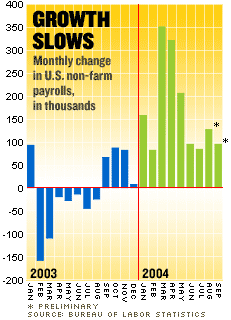NEW YORK (CNN/Money) -
U.S. employers added 96,000 jobs in September while the unemployment rate stayed unchanged, according to a government report Friday that came in weaker than Wall Street expectations.
The Labor Department report showed a slower pace of hiring than the revised reading of 128,000 jobs added in August. The consensus forecast according to economists surveyed by Briefing.com was for 150,000 new jobs; a survey by Reuters had a range of estimates from a 10,000 loss to a 200,000 gain.
The unemployment rate came in at 5.4 percent, in line with forecasts.
This employment report is the last one before the Nov. 2 election, and comes just hours before President Bush and Democratic challenger John Kerry meet for their second debate.
"In political terms, sure, this isn't good for the President," Sen. Bob Bennett, R-Utah, a Bush supporter, said to CNNfn. But he insisted it was not a sign of weakness in the economy.
In addition to the lower than forecast September gain in payroll, its expected revisions to past employment reports also was weaker than the Bush administration was hoping for.
The department said that its current reading suggests that there were 236,000 more jobs in the April 2003 through March 2004 period than originally estimated by the employer surveys. A memo by President Bush's Council of Economic Advisers reported by the Wall Street Journal earlier this week stated that revised data could be revised upward by 288,000 jobs, and as much as 384,000.

That revision and the September payroll number left the overall economy with about 585,000 fewer jobs than when President Bush took office in January 2001. Jason Furman of the Kerry campaign told CNNfn that makes Bush the first president since Herbert Hoover in the 1930s to see a decline in employment.
"We've had 11 previous presidents (since then), Democrats, Republicans. They faced wars, they faced recessions, they faced all sorts of challenges," said Furman. "Every one of them managed to create jobs until George Bush."
Labor Secretary Elaine Chao stressed the unemployment rate is only 5.4 percent, which she said is historically close to the rate in a strong labor market. She told CNNfn that all the critics of the job market were actually contributing to the economy's problems.
"What doesn't help is all the talk about the economy not doing well, people not hiring. It only spurs insecurity and it talks down the economy. What we are trying to do is lay the facts out," she said.
But Furman said the pace of hiring has not kept up with population growth, which adds about 150,000 people to the work force every month.
"All they have to offer for the economy is excuses," said Furman. "What happened in the last four months has nothing to do with 9/11 or the tech bubble or the recession or any of their excuses. The only thing keeping the unemployment rate down is 221,000 left the labor force, they gave up looking for work."
Economic worries
Outside the two sides of the campaign, experts said the economy is still showing strength, but not as much as investors and economists had hoped to see.
"Things aren't as bad as Jason (Furman) said but they're not as good as the labor secretary said," said Greg Valliere, chief strategist for Schwab Soundview. "The markets clearly were expecting a better number than 96,000. You've got to wonder ... are corporations sending us a signal that the underlying economy is not as good as people thought?"
| 
| |

| 
| 
|

|
 Bob McTeer, president of Federal Reserve Bank of Dallas, comments on disappointing job growth, high oil prices and the overall picture. Bob McTeer, president of Federal Reserve Bank of Dallas, comments on disappointing job growth, high oil prices and the overall picture.
|
 Play video
Play video
(Real or Windows Media)
|
| 
|

|
|
In an appearance on CNNfn, Dallas Federal Reserve President Robert McTeer admitted to concerns about the strength of the economy, making comments that suggested the Fed may slow its pace of measured interest rate hikes that it began in June.
McTeer said the U.S. economy "has a lot of momentum," and that he thought it would be growing at a fairly good rate, "but not gangbusters."
But he said that the jobs report was troubling, and suggested that the Fed would be careful to make sure that interest rate hikes did not hurt the economy.
"The net effect of this morning was discouraging, but you've got to put this morning together with yesterday and tomorrow and get them all lined up before you make a policy decision," he said. "I think our scare with inflation a few months ago is probably over. I think inflation is less of a worry right now than weakness in the economy."
Hurricane impact
Sen. Bennett blamed a series of hurricanes hitting Florida and the Southeast United States in September for the disappointing number.
"If we hadn't had the hurricanes I think we clearly would have been over 100,000," he said.
But the Labor Department said it couldn't find a measurable impact on employment, despite extra sampling efforts.
"At the national level, the severe weather appears to have held down employment growth, but not enough to change materially the Bureau's assessment of the employment situation in September," said the report from the department's Bureau of Labor Statistics.
Still at least one economist said he believes that the hurricanes did hit employment during the month.
"Although the BLS failed to provide an estimate of what the hurricane did to this report, my research does show that in nine out of the last 10 largest hurricanes, payrolls softened by an average of 120,000," said Anthony Chan, senior economist with J.P. Morgan Fleming Asset Management. He said he would expect a bounce back in hiring next month.

|


